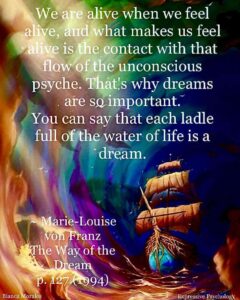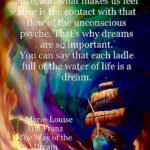 There is a sign on the journey that alerts us to the presence of our dragons and lets us know it is time to confront them. That sign is the awareness of mental and/or emotional conflict, or cognitive dissonance, and the desire to be free from it. Cognitive dissonance means there is a separation or lack of harmony between two different ways of knowing. The separation might be between our conscious thoughts and unconscious emotions, public persona and private realities, mind and body, beliefs and behavior, or all of these and more.
There is a sign on the journey that alerts us to the presence of our dragons and lets us know it is time to confront them. That sign is the awareness of mental and/or emotional conflict, or cognitive dissonance, and the desire to be free from it. Cognitive dissonance means there is a separation or lack of harmony between two different ways of knowing. The separation might be between our conscious thoughts and unconscious emotions, public persona and private realities, mind and body, beliefs and behavior, or all of these and more.
Many of us are taught that feeling pain, admitting to doubt and fear, or asking for help are signs of weakness and so we grow up acting like everything is okay. Pretending often works until midlife, but, unfortunately, after that our inner conflicts begin to express themselves in symptoms we can no longer ignore such as difficulty in relationships, addictions, depression, stress, accidents, recurring nightmares, or physical ailments.
I’m not suggesting we should whine, complain, attach blame, call attention to our discomfort with dramatic behavior, or wallow in our misery. These are just ploys immature egos use to gain attention, remain in the familiar role of victim, or avoid self-confrontation. The healing way is to admit our conflicts to ourselves and use some form of creative introversion like dreamwork, art, writing, or active imagination to clarify and come to terms with them.
After my last post, one reader, Joseph Anthony, shared his struggles with his dragons and described how he dealt with them in a form of active imagination. He says, “…when I faced my dragons…I went as a child. That might sound cute, but it’s true, and it wasn’t a conscious choice. And I don’t mean necessarily, my inner child…I mean, perhaps, an archetypal image of both creative power and wonder, and innocence—Divine Innocence.” Inspired by my post he wrote a delightful original story about this healing image and has posted it on his blog. I hope you’ll take the time to read it at http://blog.thewonderchildblog.com
Jung had a name for Joseph’s symbol of innocent childish wonder: the Divine Child. He saw it as an archetypal symbol for the Self — the whole, integrated, fully conscious psyche — and for the process of individuation which forms it. In every era and culture, this archetype shows up spontaneously in myths, fantasies and the dreams of individuals as a wise, knowing, unusual, precocious, or otherwise fascinating infant or child.
The Divine Child is an image of yourself in your purest form, with all your weaknesses and vulnerabilities, hopes and ambitions. Its appearance in your inner life means that forces are at work in your unconscious to return you to your original state of innocence, before the world wounded your trust and hardened your heart; before your ego dominated your psyche and the walls went up and the cynicism set in. But where your childhood innocence was a function of inexperience and lack of self-awareness, your newly regained transparency is a function of intentional psychological integration.
The way your dream ego relates to the Divine Child depicts your waking ego’s attitude toward the Self and your commitment to the path of consciousness. What will you do if it comes to you in a dream? Walk away from it or befriend it? Forget it or feed it? Fear it or follow it?

A Lesson on Aging
I’m so happy to be back in the mountains. I love the weather, the trees, the birds, the rushing creek, the flowering bushes. The beauty.





0 Responses
Is the devine child something that others would call an alter ego?
Dear Unmothered Child,
That’s a great question. Psychologically, an alter ego usually refers to the ego’s unknown opposite, the shadow. We all have a shadow, which is a composite of every quality in the unconscious of which our ego is unaware. Most of this is material we don’t like or want to admit to. When we are swamped by powerful emotions that we can’t seem to control we can act quite differently from the way we normally do. At times like this we are momentarily “possessed” by our shadows. This theory gave rise to the fictional story about Dr. Jekyll, the good, well-intentioned doctor, who occasionally turned into Mr. Hyde, an irresponsible and dangerous sociopath! Although we all have a “dark” side, they are rarely this extreme although there are examples of people who have multiple personalities, or what is psychologically considered a dissociative disorder; and there are others who live double lives as two different persons.
In literary analysis an alter ego refers to a fictional character whose behavior, speech or thoughts intentionally represent those of the author. Joseph’s imaginary literary creation, the divine child of innocence, is a perfect example of this way of using the term.
The Self, for which the divine child can appear as a symbol, is the term Jung used to mean one’s entire being, including both one’s conscious ego as well as one’s unconscious self, and all one’s positive and negative qualities, so strictly speaking I wouldn’t see it as an alter ego.
Thanks for stopping by and making me think! If any of my readers have more to offer on this topic, I’d welcome your comments!
Blessings,
Jeanie
Thank you Jeanie and Joseph,
It is wonderful to see the creative expression of one feed the creativity of another and thus illuminate our own personal journeys towards individuation.
Sally
Thank you, Sally! We enjoyed doing it, and I’m very glad our collaboration provided some interest and clarity for readers! Perhaps we’ll do it again one day.
My best, Jeanie
Another wonderful article, Jean.
Of course, I am partial to the section about the Divine (Wonder) Child…but your whole take on the importance of pain and dissonance also resonates very much with me. The longer I am around, the more I am able to view pain, anger, fear, and so on, as simply messengers (angels) trying to point me in a particular direction—they are neither positive or negative, although I believe their mission is ultimately one of mercy and healing—it’s just that sometimes their messages are very uncomfortable.
I also appreciate where you say, “the healing way is to admit our conflicts to ourselves and use some form of creative introversion like dreamwork, art, writing, or active imagination to clarify and come to terms with them.” Based on my own experience, I whole-heartedly agree. By the grace of the Divine Child, these have been (and still are) a part of my healing work (play), and I find myself hoping they always will be, although I am certainly open to new ways to play!
There is one thing I would like to add. After I acknowledged my conflicts to myself, another key component for my healing was admitting them to another person–someone I could trust. And with my screwed up boundary issues and trust issues stemming from the abuse, that really was a big step. To help release my soul from the shackles of shame, I needed to learn (by my own permission and wisdom) to let other people into my heart. I had to gradually open my heart to the world, little by little. Only this time, with the Divine Child leading, and with me as a Protector, I needn’t let anyone hurt him or me again.
That meant facing dragons and subsequently befriending them. That meant going through hell to get to heaven, and then finding a way to share all of this with others. So now, when the Divine Child comes to me (in both dreams and well, every moment, for we are evermore one) I take his outstretched hand and go where he wills.
The main thing though is that the Divine Child was born again in me. It started there. Look in your fb messages and your email Jean for the story of his birth.
Thanks and cheers,
Joseph
Dear Joseph,
I love how you see painful experiences as helpful angelic messengers. I think this is a truly healthy way to view things we normally resent and resist. It’s all life, and the more consciously we deal with every aspect of it, the more present and grateful we can be for the miracles we really are.
I also think that admitting your most painful experiences and deeds and qualities to someone else is very wise, as long as the other is someone we can trust, like a therapist or spiritual guide or loving family member or friend.
Finally, I’d like to congratulate you on your discovery and use of the therapeutic value of creative writing. Your stories are ways of seeing yourself and your life from a broader perspective than that of the ordinary ego. In remything your life like this you are creating sacred meaning for yourself that will sustain you in difficult times to come, lead you to your creativity, and give you a more balanced way of living that comes from your ego having a healthy relationship to the Self. The opening fairy tale for my book The Bridge to Wholeness, is an example of how I remythed my life through writing. This little story really tapped into the wells of my creativity and ended up providing the framework for the entire book. I’ve written something about this in the blog post that appeared on June 4th titled The Golden Bear. Perhaps I’ll expand on it in a later post.
Blessings,
Jeanie
I had a dream of a beautiful little girl in a yellow chiffon dress, full of brightness and purity who was hovering over prison cells – each cell contained a severed limb – tattered and torn from apart from a body. I do not recall a head. As I viewed each cell with an odd sense of both horror and interest, the little girl said, “none of this would have happened if you would have chosen me.”. I at first believed this was my three year old sister who had died seven months before my birth and to whom my parents believed would have made their family whole – and for who’s place in the family I had been a poor replacement – for which I was rejected from birth. I have since believed that was my own Divine self. Thanks for confirming this truth.
Oh, Julie. I love this exquisite, healing dream. From my Jungian perspective I would say that the beautiful little girl is, indeed, an image of your Divine Self, and the severed and imprisoned limbs she’s pointing out to your ego self are the disconnected parts of you that need to be re-integrated. Now that you are aware of this task, and of her willingness to guide you through it, I have no doubt that perservering in inner work will result in great healing for you, just as it is for Joseph. Congratulations, and best wishes, Jeanie
Can a Divine Child in a dream be either sex? I am female but dreamed of a male “golden child”–an extraordinary child that looked at me with an incredibly loving and wise face and eyes. Not sure why I dreamed of a “male” child. Thanks
I apologize, Dharma. I just saw this comment from you, almost 3 years after you wrote it. I hope you get it now. The answer is yes, a Divine Child can be of either sex, since every psyche contains both “masculine” and “feminine” qualities. If it were my dream I would think it meant that some wise and wonderful masculine aspect of my spirituality was growing within me. I contain this wise child, and I can nurture its growth by paying attention to my inner life and choosing to respond with kindness and love in my outer life. If I were to look at what new positive development was occurring in my life at the time I had the dream, it would help me identify what that masculine quality was that was growing in me. This is what I’d want to give more attention to in my waking life.
I too had the dream of Infant Jesus. ..would really appreciate if you could tell me a way to contact you..Thank You very much for the article also.
You’re welcome, Lawrence. You can contact me at jeanraffa@aol.com. Blessings.